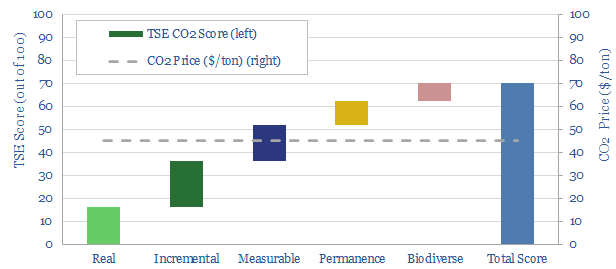The “Nicaragua High Impact Reforestation Program” should remove over 100,000 tons of CO2 from the atmosphere, by row-planting teak trees across >500 hectares of former pasture land in Nicaragua. It is our fourth detailed case study of nature based CO2 removals in 2022, with a price of $45/ton, and a passable score of 70/100 on our framework. But this Nicaragua reforestation case study also illustrates some challenges and debates around nature-based solutions.
Great virtues of this project are that it is real, incremental and measurable. The CO2 credits are certified by Gold Standard, and we were able to review 100 pages of documentation from independent auditors, verifying the CO2 removals; which seem to be measured conservatively, including a 20% ‘buffer’ for reversals.
This region of Nicaragua has been 80% deforested for cattle-grazing. There is a clear CO2 benefit to reforesting former pasture-land. GDP per capita is below $2,000 in the country. Hence it is also helpful for well-meaning investors to provide capital to convert degraded land into carbon-absorbing forests. CO2 credits contribute to the return on that investment.
Furthermore, around 25-30% of the total area in the project is residual forest, especially around water-courses, which will be preserved. This is nature-positive. Although CO2 credits are not being issued against this forest conservation.
However, this particular reforestation project is 100% row-planted teak, which will be harvested and re-planted on a 20-year cycle. Teak is not even native to Central America, but originates from South-East Asia. Some critics might argue that a short-life, row-planted mono-culture is not really ‘a forest’. And if you are not creating a forest, is it really re-forestation?
This is the logic behind the project achieving a score of 70/100 on our framework. Further details and debates are laid out in the data-file, exploring whether this Nicaragua reforestation case study can be considered ‘permanent’ (yes and no!), ‘biodiverse‘ or ‘nature positive’. So are the key numbers from our review.
We have made a $1,000 allocation to this project, in order to offset 22 tons of CO2. Our goal is to support one nature-based CO2 project each month, and to size the allocation according to the ‘score’ each project achieves on our framework.
